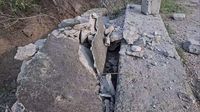In a dramatic escalation of tensions along the India-Pakistan border, heavy shelling by the Pakistani Army resulted in at least 12 civilian fatalities and dozens of injuries in the Poonch district of Jammu and Kashmir on May 7, 2025. This incident follows India’s recent military operation targeting terrorist infrastructure across the Line of Control (LoC), marking a significant increase in hostilities between the two nations.
The shelling began around 2 AM, described by local residents and officials as "barbaric and cowardly," as it unleashed chaos across multiple border villages including Mankote, Mendhar, Thandi Kassi, and Poonch city. The Pakistani forces utilized heavy artillery and mortars, leading to extensive damage to residential buildings, shops, and even historical sites like the Poonch Fort and ancient temples.
"We were not expecting such a situation at the dead of the night. We were lucky to survive the shelling and, therefore, it was better to move to some safer place for the time being," said Khurshid Ahmad, a resident of Dhaki, where over 150 families fled to the homes of relatives after their houses were damaged.
Among the deceased were two children, Mohd Zain Khan (10) and his sister Zoya Khan (12), who lost their lives in the violence. The shelling also claimed the life of Balvinder Kour, a 33-year-old woman, whose husband, Kala Singh, was injured in the attack. The local administration reported that five individuals, including two forest guards, were wounded as shells exploded near their office.
In response to the shelling, the Indian Army stated it would retaliate in equal measure, emphasizing that civilian safety remained a top priority. "The Indian forces hit terrorist targets like the headquarters of the Lashkar-e-Taiba (LeT) and Jaish-e-Mohammad (JeM), which have targeted security forces and innocent civilians in Jammu and Kashmir for the past 35 years," noted former Jammu and Kashmir DGP S P Vaid.
This violent outbreak came shortly after India launched "Operation Sindoor," a military initiative aimed at dismantling terrorist camps in Pakistan and Pakistan-occupied Kashmir (PoK). The operation was a direct response to a recent terror attack in Pahalgam that killed 26 individuals, prompting Indian forces to strike at nine identified terror infrastructure sites.
Reports indicate that the Indian Air Force executed precision strikes on these camps, leading to significant casualties among terrorist groups. Pakistan, however, claimed that its civilian population suffered greatly, with at least 26 reported deaths from the Indian airstrikes.
The shelling on May 7 marked the 13th consecutive night of unprovoked cross-border firing, escalating fears among local residents. Schools and educational institutions across the Jammu region were closed as a precautionary measure. Divisional Commissioner Ramesh Kumar stated, "In view of the prevailing situation, all schools, colleges, and educational institutions in Jammu, Samba, Kathua, Rajouri, and Poonch will remain closed today."
Videos circulating on social media captured the chaos and destruction, drawing widespread outrage and condemnation from various quarters. Local officials are coordinating relief efforts as fire service teams have been deployed to manage the blazes ignited by shelling.
National Conference MLA Aijaz Jan expressed concern over the situation, stating, "The situation is worrisome given the damage caused by the shelling. Chief Minister Omar Abdullah is closely monitoring the developments." Meanwhile, the Indian Army reaffirmed its commitment to protecting civilians while responding decisively to ceasefire violations.
The international community is also watching the situation closely. Pakistan’s Defense Minister Khawaja Asif indicated that the country would refrain from retaliatory measures if India ceases military operations, but warned that Pakistan would respond at a time of its choosing if provoked.
While the situation remains tense, the Indian government has maintained that its operations are focused and measured, aimed solely at dismantling the terror infrastructure that threatens its national security. As Prime Minister Narendra Modi stated, "Our actions have been focused, measured, and non-escalatory in nature."
However, the ongoing violence raises serious concerns about civilian safety and the potential for further escalation in the region. As families continue to flee their homes in search of safety, the humanitarian implications of this conflict cannot be overlooked.
In the face of such turmoil, the local population grapples with the fear of further attacks while hoping for a swift resolution to the violence that has plagued the region for decades. The situation in Poonch serves as a stark reminder of the fragile peace that exists along the India-Pakistan border, as both nations remain locked in a cycle of retaliatory violence.


